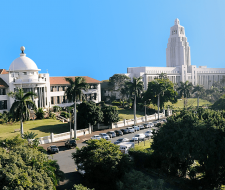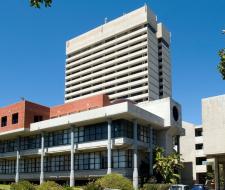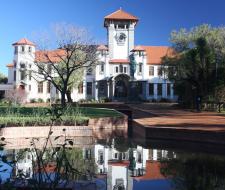Higher education in South Africa for international students
- Higher education system in South Africa – specifics of studying
- Higher education in South Africa for foreign students
- Tuition fee of higher education in South Africa for foreign students
- Why choose South Africa to study?
- How school education works in South Africa
- Admission to South African universities
-
 #2 in Best Global Universities in South Africa
#2 in Best Global Universities in South Africa South AfricaJohannesburgCurrently watching: 2from 3000.00 $ / year
South AfricaJohannesburgCurrently watching: 2from 3000.00 $ / year -
 #9 in Best Global Universities in South Africa
#9 in Best Global Universities in South Africa South AfricaPretoriaCurrently watching: 2from 1000.00 $ / year
South AfricaPretoriaCurrently watching: 2from 1000.00 $ / year -
 #8 in Best Global Universities in South Africa
#8 in Best Global Universities in South Africa South AfricaCape TownCurrently watching: 2from 5000.00 $ / year
South AfricaCape TownCurrently watching: 2from 5000.00 $ / year -
 #4 in Best Global Universities in South Africa
#4 in Best Global Universities in South Africa South AfricaBloemfonteinCurrently watching: 1from 3000.00 $ / year
South AfricaBloemfonteinCurrently watching: 1from 3000.00 $ / year -
 #13 in Best Global Universities in South Africa
#13 in Best Global Universities in South Africa South AfricaPort ElizabethCurrently watching: 1
South AfricaPort ElizabethCurrently watching: 1 -
 #10 in Best Global Universities in South Africa
#10 in Best Global Universities in South Africa South AfricaBloemfonteinCurrently watching: 1from 5000.00 $ / year
South AfricaBloemfonteinCurrently watching: 1from 5000.00 $ / year -
 #12 in Best Global Universities in South Africa
#12 in Best Global Universities in South Africa South AfricaPretoriaCurrently watching: 2
South AfricaPretoriaCurrently watching: 2 -
 #14 in South Africa
#14 in South Africa South AfricaCape TownCurrently watching: 1from 1600.00 € / semester
South AfricaCape TownCurrently watching: 1from 1600.00 € / semester
Studying in South Africa for students is one of the ways to get a high–quality education abroad. The Republic of South Africa belongs to the States with a well-established reputation as an international educational center. Here, foreign students can acquire not only a certificate or diploma, but also a large number of vivid impressions from contact with the difficult history and diverse culture of the country.
South Africa offers education to the foreign students with teaching in English at any level. South Africa's education system consists of three stages: it includes primary, secondary, specialized secondary and higher schools. A specialty can be obtained in college, but higher vocational education is provided by technical schools and universities — the difference between them is small in terms of the prestige of the diploma and the quality of education. Institutions differ fundamentally in academic direction: universities prepare specialists in the humanities, in technical schools you can get a specialty to work in the field of industry or commerce.
University educational programs are in demand among foreign students due to the high level of qualification of graduates and teaching in English – one of the state languages, relatively low cost of educational services, rental housing and food. Language schools are popular among international students, which offer a wide choice of English courses. Private schools in South Africa invite those who want to prepare for university admission. Education is high-tech: the universities in South Africa use the maximum number of promising modern techniques. Highly qualified teachers with international certificates teach academic disciplines to foreign students.
Alternative destinations
Higher education system in South Africa – specifics of studying
South Africa is one of the most developed countries on the continent, which opens up a variety of tourist opportunities for international students: stunning natural, urban landscapes, a unique cultural environment. Studying in an intercultural environment is a great opportunity to make new friends and make useful acquaintances.
Education in South Africa in the best higher educational institutions of the country, which occupied positions in the world and national rankings is a quality studying in English in a multicultural environment. Universities in South Africa offer bachelor's and master's degree courses. Classical universities focus on traditional theoretical, research-oriented education, technical schools make an emphasis on vocational education.
There are currently 23 state-funded higher education institutions and 115 private universities in South Africa. The educational programs at universities include most academic areas, there are MBA courses. For international students, upon admission, the procedures established for the enrollment of South African citizens apply.
Higher education in South Africa for foreign students
Bachelor's and master's degrees can be obtained at the best universities in South Africa, which are in the top 10 of the national ranking and even in the lists of the best universities in the world:
- University of Cape Town;
- University of Johannesburg;
- University of the Witwatersrand;
- University of KwaZulu-Natal (Durban).
Leading universities offer international students educational programs in a wide range of academic areas:
- Business, economics;
- Art, design, architecture;
- Education;
- Healthcare;
- Engineering, construction;
- Humanities;
- Natural sciences;
- Management;
- Law;
- Agricultural sciences;
- Engineering graphics, design;
- Information technology;
- Religious studies;
- Drama, fine arts.
South African university teachers are leading experts in their fields with international certificates, as well as professors and experts are invited to conduct classes. The educational base of universities stipulates using of high-tech equipment: students attend modern laboratories, libraries. Graduates of South African universities occupy top positions in international companies, speak English well, have experience in intercultural communication, exchange studying, internships at foreign enterprises.

What advice do you have for those aspiring to attend top universities?
Thoroughly research your chosen university, including tuition fees, as these can vary widely. Prepare well for English proficiency tests like IELTS, which are essential for admission to any university. Focus on your preferred courses, checking their specific academic requirements, and ensure you are well-prepared in those areas.
Tuition fee of higher education in South Africa for foreign students
Universities in South Africa offer different tuition rates for students from neighboring countries, Africans and international students. The average tuition fee depends on the degree received: 16,000 — 22,000 RAND per year of study for a bachelor's degree, 20,000 - 30,000 rand per year of study for a master's degree. The bachelor's degree program lasts three years. Those wishing to study for a master's degree must wait one year, after which they can apply for continuing education.
In case of enrolment, foreign students must provide a diploma of full secondary education and a certificate of proficiency in English — TOEFL or IELTS. The international students can enter one of the universities of South Africa only with a national certificate of secondary education with a maximum score, providing a portfolio of your scientific school papers or sports achievements, as well as having an interview with the dean. The requirements for applicants are high, and the level of education in universities is quite high.
Why choose South Africa to study?
There are several reasons for studying in South Africa:
- A fairly high level of education. South African universities - Cape Town, the University of Pretoria, the University of the Witwatersrand - are far from the last places in world rankings. Many of them are accredited by international organizations, for example, accreditation agencies in the UK and the USA, which confirms the compliance of their educational standards with international requirements. Diplomas obtained in South Africa are recognized in many countries of the world, opening up wide employment opportunities for graduates both in South Africa and abroad.
- Teaching at most universities is conducted in English, which is a significant plus for international students, greatly facilitating the process of learning and adaptation.
- South Africa offers a unique cultural diversity. It is a country with a rich and complex history, where different cultures and traditions are intertwined, where representatives of different ethnic groups live, including the Zulus, Xhosa, Tsonga and many others. This cultural diversity creates a unique atmosphere of tolerance and mutual respect, contributing to the broadening of horizons and the development of intercultural competence among students.
- Studying in South Africa is not only an academic experience, but also an unforgettable journey through one of the most beautiful countries in the world. South Africa is famous for its stunning natural landscapes, from the sandy deserts of Namibia to the scenic mountain ranges of the Drakensberg Mountains, from lush beaches to lush savannahs and unique flora and fauna. The opportunity to visit the famous Cape of Good Hope, see the "Big Five" in the national parks of Kruger or the Cape Town Peninsula, get acquainted with African cuisine and art - all this will make studying in South Africa an unforgettable adventure.
- It is worth noting the relatively affordable cost of education and living in South Africa. Although the cost of studying at private universities can be quite high, many public universities offer more affordable programs, there are various scholarships and grants from both the South African government and international organizations that help international students finance their studies. The cost of living in the republic is much lower than in Europe or North America, which makes studying here economically profitable.
How school education works in South Africa
- Primary education, lasting 9 years, begins with the first grade, where children are enrolled at the age of 5.5-6; This stage is mandatory. The nine-year primary education course is divided into three stages of three years; After each stage, an intermediate assessment of students' progress is carried out, the results of which affect further learning, but are not a prerequisite for moving to the next level. The knowledge assessment system includes both oral and written forms of control, as well as project work, which contributes to the development of critical thinking and independent work skills. The primary education program in Africa is quite standard and includes subjects such as mathematics, science, languages (including English as the main language of instruction and one of the 10 official languages in South Africa), history, geography, art, music and physical education. It is worth clarifying that there are 11 official languages in the country, and textbooks are published in all of them! Multilingualism is one of the hallmarks of the South African education system, although English is preferred in teaching.
- After completing primary education, at the age of 15, students move on to secondary school. Secondary education in South Africa lasts 3 years (grades 10-12) and is more specialized - students choose certain profiles of study, focusing on their interests and future career plans: natural sciences, humanities or engineering. At the end of secondary education, students take national examinations (Matric), the results of which are the basis for admission to higher education institutions: high scores on these exams open the door to prestigious universities and colleges both in South Africa and abroad.
Admission to South African universities
Each university sets its own requirements. In addition to a certificate confirming knowledge of the school curriculum, entrance exams, a portfolio and an interview may be required. International students need to take an English language test (TOEFL or IELTS).
After receiving confirmation of enrollment, it is necessary to apply for a student visa, providing the consulate with the relevant certificate from the university and other necessary documents. Some universities may require personal presence to take additional entrance exams - in this case, a visitor or tourist visa is issued.
Learning programs-summary information
| Name | Meaning | Equivalent | Min. age | Duration, years |
Next stage | Cost |
|---|---|---|---|---|---|---|
| GCSE | General certificate of secondary education | secondary education (non-accomplished) | 14 | 1–2 | A-Levels | 15,000 USD+ |
| A-Levels | Advanced level | secondary education (accomplished) | 16 | 2 | University | 15,000 USD+ |
| BTEC | Business and Technology Education Board | secondary special education | 14 | 2–3 | University/ work | 15,000 USD+ |
| Oxbridge Preparation | Preparing for Oxford and Cambridge | secondary education (accomplished) | 17 | 1 | University | 15,000 USD+ |
| International Baccalaureate | International baccalaureate | secondary education (accomplished) | 16 | 2 | University | 18,000 USD+ |
| Foundation/ Pathway Year | Preparatory year | admission to the 1st year of university | 17 | 1 | University | 14,000 USD+ |
| NCUK | The Northern consortium | 2 year university | 17,5 | 1 | 2 year University of NCUK | 13,000 USD+ |
| Special Preparation (Medics/Math/Business) | Specialized training | - | 14 | optional | optional | 4,000 USD+ |
| Academic English | Academic English | Language school | 8 + | 6–12 months | School or University | 8,000 USD+ |
Top 14 best universities in Switzerland 2026
| 1 | Glion Institute of Higher Education Switzerland |
| 2 | Les Roches International School Montana |
| 3 | César Ritz Colleges Switzerland |
| 4 | IHTTI School of Hotel Management |
| 5 | Ecole Hoteliere de Lausanne |
| 6 | Geneva Business School |
| 7 | HIM Hotel Institute Montreux |
| 8 | Swiss Hotel Management School |
| 9 | Webster University Geneva |
| 10 | Business and Hotel Management School |
| 11 | Luzern IMI |
| 12 | Swiss Hotel Management School (SHMS) Caux |
| 13 | International University in Geneva |
| 14 | Culinary Arts Academy Switzerland |
